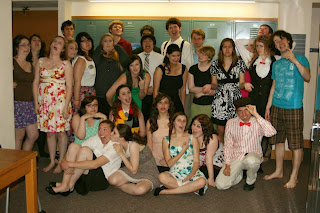I discovered this article. Way before reading it I have noticed that there are a lack of funny women - as the author states, "Please do not pretend not to know what I am talking about."
I think I may have noticed this a few years back when I saw friends of mine posting on Facebook about how funny Chelsea Handler is. I don't think she is funny. Well, I just checked out some videos, and I admit that she can be quick and a bit witty, but not enough for me to want to go out of my way to watch her show.
It got me thinking, "Why can't I find as many funny women as men?"
At my school, there are more males than females in the troupe, and I do think they're funny, but not as much as the men.
The main problem is that I think women try too hard. I mean, men do too, but in my experience, women tend to do it more noticeably.
Most important rule of when trying to be funny: don't try to be funny.
I'm not sure if that rule is universally-accepted as being the most important rule of when trying to be funny, but it should be.
I especially hate it when people actually do or say something legitimately funny, but backfire it by saying, "Nevermind, that wasn't funny." It's just like improv - make a choice and stick with it (in this case, it's whether or not you're trying to make something funny).
I believe women in the entertainment industry have a long ways to go - there are not many funny women, few female directors, and scripts are written with usually more men than women characters, and then those women characters tend to lack substance.
That is one reason why I am interested in writing.
In theater, I have noticed that there are usually more female than male actors. However, there are more male characters. For one acting class, I was paired with another girl and we had to find a scene to perform, preferably with the characters being around our age. It took us days to find a decently long scene with two women with no other characters, and it was a mother-daughter scene, so not really around our real ages.
I can go on talking about women characters, and how a lot of them lack that substance I have previously mentioned...but that will be saved for another post.
I wonder what led women to be less funny than men. I would think that it has to do with to do with societal pressures and norms rather than biological differences (not ruling that out though). It may be similar to how repressed females are to their own sexuality (which, of course, I will cover in the near future).
In the article I mentioned at the beginning, the author's partner told him, "Women get funnier as they get older."
I have kind of noticed that. Not only do they seem to get funnier, but a bit more perverted too, especially if they've been married. I will definitely talk more about this when it comes to my female sexuality post.
People have asked me why I have decided to make this blog. These are the reasons I cite:
1) I want to educate people about politics, expand their minds, and get them to think outside the box.
2) Where I am currently living (Bellingham), conservatives and libertarians don't seem to have much of a voice. I had been trying to find a conservative or libertarian who would keep up a blog. Finally, I was like, "Fine, I'll do it." Oh yeah, that reminds me, I also need to keep up with local politics...
3) I need to practice my writing.
For the third reason, you may think, "Oh, she needs to practice writing for professional magazines, books, and other professional-y stuff." Actually, I am mainly practicing my comedy. Maybe you have noticed the title of my blog.
I am going talk about why exactly a comedy on a later date.
 |
| Look at how funny I am with the rest of the WWU Glee Club |
People react to my humor in two ways: either A) "You're so hilarious!" and I'm like, "Oh, I never realized I was funny," (and it's sincere) or more commonly B) "Why are you being so serious?" and I reply, "Dude. I'm kidding." Oops, I guess I can be a little too dry.
In what ways do you think we can get more women to jump onto the comedic bandwagon, and most importantly, actually succeed in that area?


No comments:
Post a Comment